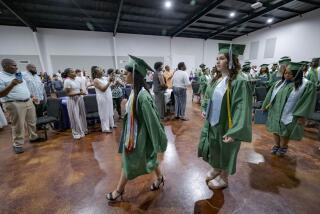Today’s Courses Include Vacuuming, Cleaning Toilets : Finishing Schools Modernizing Curriculum
- Share via
GLION, Switzerland — High in the Swiss Alps, in a turn-of-the-century villa with a breathtaking view of Lake Geneva, Viviane Neri is teaching young ladies how to function in high society.
But unlike finishing schools of the past, her curriculum includes instructions on such things as how to clean a toilet and run a vacuum cleaner.
“It helps keep them from becoming snobs,” says Neri, who has run the Villa Pierrefeu Finishing School since 1972. “Anyway, you can’t train a servant to do something well if you don’t know how to do it yourself.”
Neri’s elegant villa, in this small town above Montreux, is one of a handful of finishing schools in Switzerland.
In the early part of the century, Switzerland, with its many private schools for young ladies, was the place for the well-to-do in Europe and the United States to send their daughters to learn European culture and French.
But as “finishing” has gone out of fashion, many of those schools have introduced courses in typing, business and hotel management as well.
Neri’s school is considered the most traditional, offering only a rigorous finishing program, and is the most expensive, at $30,000 for a one-year stay. Others average about $18,000.
Fluency in French Required
Students come from around the world, she says, because “there really isn’t another school like this.” Some schools in England come close, she adds, but they don’t require fluency in French.
Finishing schools were among Switzerland’s many private schools and universities that successfully fought a proposed law this summer that would have sharply limited the stay of foreign students in the country.
The Villa Pierrefeu has room for 34 students and is full every year. This year’s group includes primarily West Europeans and Latin Americans, with one American, several Australians and one Japanese.
Courses include protocol, etiquette and “savoir-vivre,” or how to be at ease in any situation, as well as French and English.
And it’s not the bed of roses some might think.
“I never tell people at home that I’m going to a finishing school because they think I’m just going to lay off in some posh school and not do anything,” says Rebecca, 18, from Wichita, Kan. “It’s quite the opposite. We have to do everything.”
Students who were interviewed declined to give their last names to protect their privacy.
Students at Villa Pierrefeu have 38 hours of classes a week. They make their own beds, clean their bathrooms and iron their own clothes. They prepare and serve meals for each other, with varying degrees of success.
How to Fold a Napkin
“Cooking is not my forte,” said Joline, 24, from Queensland, Australia, explaining that she had to remake a batch of flaky pastry because she mistakenly added 1 1/2 tablespoons, rather than teaspoons, of salt.
A class on “table decoration” one day found a group of young women studying what looked like a complicated civil engineering blueprint but was actually a diagram of how to fold a dinner napkin.
At final exam time, the young ladies must prepare and hold a banquet for two dozen people.
Neri does not find it surprising that parents pay large sums for their children to learn something they could probably learn at home.
“You don’t always listen to your mother because she’s been nagging you all your life,” she says. “You listen to your teacher because she has authority.”
Students say the school is worthwhile because of the emphasis on learning French, on mingling with other cultures and on running an organized household. Many hope to eventually have high-powered jobs that will require a touch of worldliness.
The young women are not “dimwitted socialites, as most people think,” Neri says.
“We had girls who went on to be journalists, bank managers, art dealers, restorers of antique books, and one even went to work in a field hospital in Colombia. Of course, some do just want to get married.”
Their parents are mostly lawyers, doctors, executives.
Up From the Farm
“One girl’s parents were farmers,” Neri says. “OK, it was a very big farm, but still, they were farmers.”
The young women look and dress like young women anywhere, with several exceptions. No blue jeans, no jogging suits, no ski pants and no contour-hugging knit “leggings” are permitted at Neri’s school.
The hours are strict--in by 7 p.m. weekdays, 9 p.m. Fridays and Sundays and 11 p.m. on Saturdays.
The school has its share of discipline problems; one or two young women are expelled each year. But Neri said there are “very few” drug problems.
Although many outsiders think finishing schools are an anachronism, Neri says Villa Pierrefeu has evolved to meet today’s needs.
“We have a more realistic approach to social graces, one might almost say a more bourgeois approach,” she says. “You do talk about money management and about the cost of things, which just wasn’t done before.”
It also teaches young women how to do things that have been done for them all their lives.
“One European girl didn’t realize before she came here that a vacuum cleaner had to be plugged into a wall socket in order to function,” Neri says.
More to Read
Sign up for Essential California
The most important California stories and recommendations in your inbox every morning.
You may occasionally receive promotional content from the Los Angeles Times.










